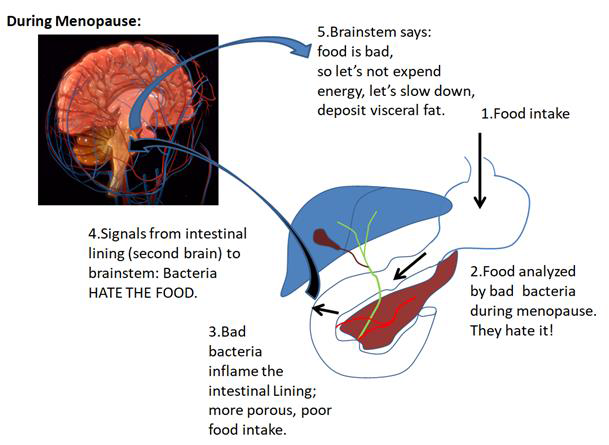In my women’s group, much of our conversation is about weight gain. All my doctors tell me that in order to lose weight, I need to change my diet and get rid of carbs. Isn’t exercise part it?
Your Menopause Question: In my women’s group, most of us are going through menopause, and much of our conversation is about weight gain. All my doctors tell me that in order to lose weight, I need to change my diet and get rid of carbohydrates. I walk my dog each day. Isn’t exercise part of the discussion?
I have read that the communication between our intestine and our brain is why we gain weight in menopause. Can you explain?
Your Menopause Question: I have read that the communication between our intestine and our brain is why we gain weight in menopause. Can you explain?
I am 48 years old and suddenly gaining weight around my midsection. My doctor mentioned “metabolic syndrome” and its health risks. What is that?
I am 48 years old and suddenly gaining weight around my midsection. My doctor mentioned “metabolic syndrome” and its health risks. What is that?
I am 48 years old and suddenly gaining weight around my midsection. My doctor mentioned “metabolic syndrome” and its health risks. What is that?
Question: I am 48 years old and suddenly gaining weight around my midsection. My doctor mentioned “metabolic syndrome” and its health risks. What is that?
Metabolic Syndrome and the Role of Estrogen
Metabolic syndrome represents a cluster of adverse biologic events characterized by alterations in lipids, elevated blood sugar, and increased cardiovascular risk. According to the National Cholesterol Education Program’s Adult Treatment Panel 111 Report, metabolic syndrome may be diagnosed when three of the following criteria are present: waist circumference greater than 88 cm, HDL-C less than 50 mg/dL, triglycerides greater than 150 mg/dL, blood pressure above 130/85 mmHg, or fasting blood sugar over 110 mg/dL. The greatest health risk of metabolic syndrome is cardiovascular disease, but this risk also is age related. Sixty percent of postmenopausal women are affected by metabolic syndrome, whereas only 22% of the general population meet these criteria. These differences in prevalence underscore the dramatic physiologic changes that occur as a woman enters menopause.





